Related Research Articles

Greenpeace is an independent global campaigning network, founded in Canada in 1971 by a group of environmental activists. Greenpeace states its goal is to "ensure the ability of the Earth to nurture life in all its diversity" and focuses its campaigning on worldwide issues such as climate change, deforestation, overfishing, commercial whaling, genetic engineering, anti-war and anti-nuclear issues. It uses direct action, advocacy, research, and ecotage to achieve its goals.

Mahogany is a straight-grained, reddish-brown timber of three tropical hardwood species of the genus Swietenia, indigenous to the Americas and part of the pantropical chinaberry family, Meliaceae. Mahogany is used commercially for a wide variety of goods, due to its coloring and durable nature. It is naturally found within the Americas, but has also been imported to plantations across Asia and Oceania. The mahogany trade may have begun as early as the 16th century and flourished in the 17th and 18th centuries. In certain countries, mahogany is considered an invasive species.

The Sea Shepherd Conservation Society (SSCS) is a non-profit, marine conservation activism organization based in Friday Harbor on San Juan Island, Washington, in the United States. Sea Shepherd employs direct action tactics to achieve its goals, most famously by deploying its fleet of ships to track, report on and actively impede the work of fishing vessels believed to be engaged in illegal and unregulated activities causing the unsustainable exploitation of marine life.

American President Lines, LLC, is an American container shipping company that is a subsidiary of French shipping company CMA CGM. It operates an all-container ship fleet, including nine U.S. flagged container vessels.
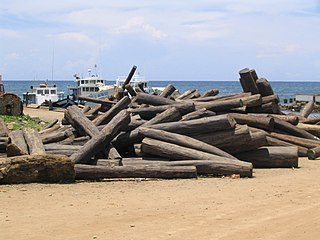
Illegal logging is the harvest, transportation, purchase, or sale of timber in violation of laws. The harvesting procedure itself may be illegal, including using corrupt means to gain access to forests; extraction without permission, or from a protected area; the cutting down of protected species; or the extraction of timber in excess of agreed limits. Illegal logging is a driving force for a number of environmental issues such as deforestation, soil erosion and biodiversity loss which can drive larger-scale environmental crises such as climate change and other forms of environmental degradation.

Transshipment, trans-shipment or transhipment is the shipment of goods or containers to an intermediate destination, then to another destination.
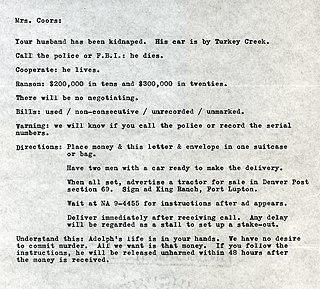
Shanghaiing or crimping is the practice of kidnapping people to serve as sailors by coercive techniques such as trickery, intimidation, or violence. Those engaged in this form of kidnapping were known as crimps. The related term press gang refers specifically to impressment practices in the United Kingdom's Royal Navy.

Rum-running, or bootlegging, is the illegal business of smuggling alcoholic beverages where such transportation is forbidden by law. The term rum-running is more commonly applied to smuggling over water; bootlegging is applied to smuggling over land.
The Mahogany Ship is a putative early Australian shipwreck that is believed by some to lie beneath the sand in the Armstrong Bay area, approximately 3 to 6 kilometres west of Warrnambool in southwest Victoria, Australia. In many modern accounts it is described as a Spanish or Portuguese caravel after the wreck was associated with the theory of Portuguese discovery of Australia by Kenneth McIntyre in his 1977 book The Secret Discovery of Australia. The most recent research has questioned this theory and provided other explanations.
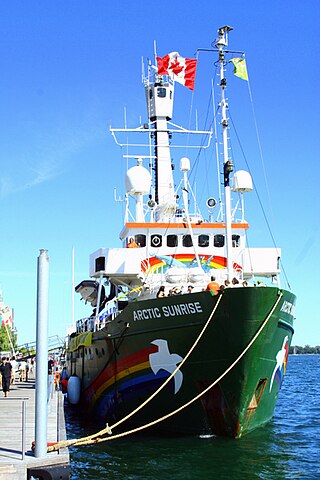
Arctic Sunrise is an ice-strengthened vessel operated by Greenpeace. The vessel was built in Norway in 1975 and has a gross tonnage of 949, a length of 50.5 metres (166 ft) and a maximum speed of 13 knots. She is classified by Det Norske Veritas as a "1A1 icebreaker". The ship is powered by a single MaK marine diesel engine.
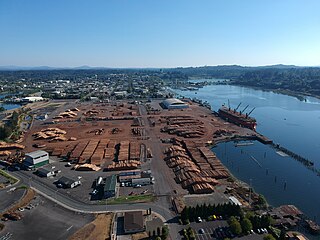
Port Militarization Resistance (PMR) is an anti-war movement in the United States. The movement began in May 2006, in Olympia, Washington, but also has chapters in Tacoma, Washington, Grays Harbor, Washington, and the Mid-Atlantic region. Port Militarization Resistance is also the name of the strategy employed by this movement. Adherents of the PMR strategy advocate an end to the Iraq War and the War in Afghanistan to be accomplished through making civilian-owned ports inaccessible to the military, with less emphasis on persuading elected officials to abandon the war. PMR organized high-profile protests at the Port of Olympia and the Port of Tacoma in 2006, 2007, 2008, and 2009.

The Dunedin (1874–90) was the first ship to successfully transport a full cargo of refrigerated meat from New Zealand to England. In this capacity, it provided the impetus to develop the capacity of New Zealand as a major provider of agricultural exports, notwithstanding its remoteness from most markets. Dunedin disappeared at sea in 1890.

A barracks ship or barracks barge or berthing barge, or in civilian use accommodation vessel or accommodation ship, is a ship or a non-self-propelled barge containing a superstructure of a type suitable for use as a temporary barracks for sailors or other military personnel. A barracks ship, a military form of a dormitory ship, may also be used as a receiving unit for sailors who need temporary residence prior to being assigned to their ship. The United States Navy used to call them Yard Repair Berthing and Messing with designations YRBM and YRBM(L) and now classes them as either Auxiliary Personnel Barracks (APB) or Auxiliary Personnel Lighter (aka barge) (APL).
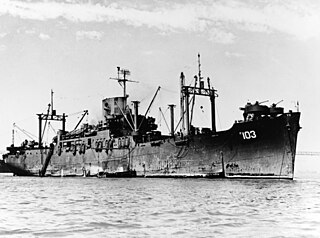
USS President Polk (AP-103) was a President Jackson-class attack transport in the service of the United States Navy during World War II.

Anti-whaling refers to actions taken by those who seek to end whaling in various forms, whether locally or globally in the pursuit of marine conservation. Such activism is often a response to specific conflicts with pro-whaling countries and organizations that practice commercial whaling and/or research whaling, as well as with indigenous groups engaged in subsistence whaling. Some anti-whaling factions have received criticism and legal action for extreme methods including violent direct action. The term anti-whaling may also be used to describe beliefs and activities related to these actions.

Prostitution laws varies widely from country to country, and between jurisdictions within a country. At one extreme, prostitution or sex work is legal in some places and regarded as a profession, while at the other extreme, it is considered a severe crime punishable by death in some other places. A variety of different legal models exist around the world, including total bans, bans that only target the customer, and laws permitting prostitution but prohibiting organized groups, an example being brothels.
Many legal assessments of the Gaza flotilla raid were published subsequent to the event. International law experts differed over the legality of the action by Israel. The force necessary to respond to violent resistance and whether the force that was used was proportionate were disputed.
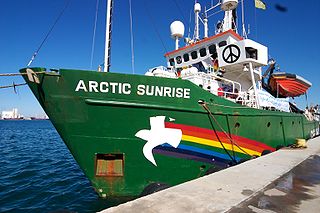
On 18 September 2013, Greenpeace activists attempted to scale the Prirazlomnaya drilling platform, as part of a protest against Arctic oil production.

The Port of Paranaguá is one of the main ports of Brazil and Latin America. It is located in the city of Paranaguá, in the Brazilian state of Paraná, is the second largest port of Brazil in tonnage and the third in container shipping. It is a main exporting port of agricultural products in Brazil, especially soybeans and soybean meal.
International piracy law is international law that is meant to protect against piracy. Throughout history and legal precedents, pirates have been defined as hostis humani generis, Latin for "the enemy of all mankind". The United Nations has codified much of the law in the United Nations Convention on the Law of the Sea (UNCLOS), which defines different types of piracy and ways to combat it.
References
- ↑ Federal Reporter, Vol. 42, United States v Sullivan. Same v Scott. (Circuit Court, D. Oregon. October 8, 1890.), pp. 602-605 (http://openjurist.org/43/f1d/602)
- ↑ "Greenpeace Activists Board Ship Carrying Illegal Mahogany - Greenpeace USA".
- ↑ "The Greenpeace Effect | News | Miami | Miami New Times | The Leading Independent News Source in Miami, Florida".
- ↑ Liptak, Adam (October 11, 2003). "Typical Greenpeace Protest Leads to an Unusual Prosecution". The New York Times . Retrieved May 9, 2018.
- ↑ "U.S. Suit Against Greenpeace Dismissed". Los Angeles Times . May 20, 2004. Retrieved May 9, 2018.
- ↑ Roig-Franzia, Manuel (May 20, 2004). "Judge Dismisses Greenpeace Charges". The Washington Post . Retrieved May 9, 2018.
- ↑ "Partners in Mahogany Crime - Greenpeace USA".
- ↑ "Mahogany Listing History".